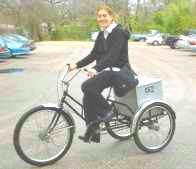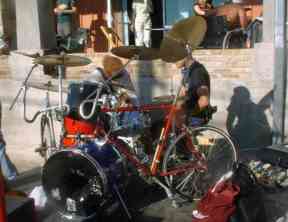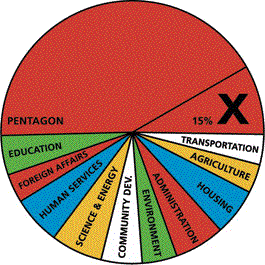If the newsletter below doesn't appear to be formatted properly (or doesn't appear at all), you can read the newsletter online at: http://BicycleUniverse.info/newsletters
|
Car-Free
World |
April 11, 2003 |
|
Research/Tips: Ken Marsh, Mike O'Shea Editor: Michael Bluejay |
|
Contents From the Editor Regional General Classifieds Car-Free World, a publication of and ©2003 by
BicycleAustin.info,
covers alternative transportation, especially bicycling.
We're not opposed to cars,
we're opposed to the car
culture. CFW is published sporadically, and may be
discontinued at any time without notice. We currently have
over 700 subscribers. Here are links to subscribe
or unsubscribe. Articles are by the editor if uncredited. Articles by
others may have been edited for grammar, clarity,
conciseness, superstition, or just for the hell of it.
|
Here's our new pricing: A few people didn't want the box on the back, and we decided it wasn't fair to charge them for it. So a basic 3-speed trike is now $290, and the box is $50 extra. We're also offering an optional drivetrain upgrade which makes the trike easier to pedal (28-tooth chainring and new chains) for $60. Finally, if you're not near Austin, we can now ship trikes assembled for $90. Our new sales page is up at http://BicycleSafe.com/trikes. I have lots more pictures up now. One last thing -- if you happen to see a genuine Worksman trike anywhere for less, I'd like to know about it! :) |
|
Yet another poll Here's your chance to improve the website. Head over BicycleAustin.info and vote on how you want the menus to work. I often have a hard time deciding the best way to do something on the site, but I can always count on the 700+ people on this mailing list to tell me what they prefer. Rodeo Report Regional
News What are sidewalks for? If you think they are for pedestrians to walk safely, then welcome to Atlanta, where the state Department of Transportation considers them to be "auto recovery zones." As the DOT sees it, the sidewalk is a buffer, so if a driver veers off the road while talking on his cell phone, he has a chance to yank the car back on the road. This startling piece of information came out when a developer tried to get the DOT's permission to plant trees between his development's sidewalks and the street, to give the walkways a shaded appearance. Absolutely not, the DOT said. If a car hit a tree, one official said, it would surely hurt the car. But if a car roars up on a sidewalk, there's a chance it won't hit any pedestrians. "It's kind of like asking the question, which is the lesser of two evils? We want to protect the pedestrian, but we want to protect the drivers as well," the official said. Pedestrian advocates are amazed. "(The DOT) would rather have a pedestrian killed by a car than have a car fender dented," said one. Footnote: Atlanta is routinely ranked as one of the most dangerous cities in the country for pedestrians. In 2001, 64 pedestrians were killed there. Some of them, apparently, were walking on auto recovery zones. General It's easy to point out the obvious about the war: That the pretext was Iraq's supposed weapons of mass destruction, though none were found. That Saddam wielded his power ruthlessly, though he got his power with the U.S' help in the first place. That his weapons threatened his neighbors, as though there aren't other countries with even more dangerous weapons and an even greater history of violent conflict. That the Iraqi people needed to be liberated, as though we can expect to see a Western-style democracy emerge there just as successfully as the one that emerged after we torched Afghanistan (meaning not at all). That the obvious ways for addressing Saddam's threats and crimes -- weapons inspections, human rights monitors, and a war crimes tribunal -- were barely tried or considered. Or perhaps the most salient point at all: In all likelihood, the war has increased the chance of further terrorist acts against the U.S. and made us less safe, not more. If we assume that the 9/11 terrorists didn't level the WTC as an afterthought but in fact did so because of a hatred of the U.S., what will fuel that hatred even more than the invasion of a poorly-defended Muslim nation against the cries of the world community? But like I said, all that is easy to point out. What's not so obvious is what the war portends for our transportation future. Some have opined that the impending oil crisis has been delayed as a result of the war. But the fact is that there's still the same amount of oil in the ground, no matter who controls it. (Minus the oilfields that were torched during the conflict, of course.) The war has done nothing to avert the explosion in oil prices that petroleum geologists are predicting by the end of the decade. (See OilCrisis.com.) So what's going to happen when the price of oil surges? Many people seem to think only about the difficulty of personal transportation when gas gets expensive. But that's not going to be the biggest problem, not by a longshot. Rather, it's the increased cost of shipping food, raw materials, and finished products which is going to cause a global economic meltdown. When the cost of any product you might buy increases by 20% or more because the company had to pay more to ship it to the stores, then people will obviously buy less of those products. When sales go down, the company will make less money, and will lay off workers. When the workers are laid off, they'll have less money, so they'll buy fewer goods. This will result in even less company profit, and thus more layoffs, meaning consumers will have less money and buy less, and company profits will go down further, and we'll be stuck in a downward spiral. This is going to be a bigger concern than whether you have to spend an extra dollar to get to work. There's no easy solution to this mess, though we can expect to see a resurgence in the popularity of trains, for moving both people and goods/products. Old as they are, trains are the most efficient means of transportation we've ever devised, and other technologies are unlikely to compete effectively. Hybrid cars? Gas will still be too expensive when the price surges, and what about moving goods and products? Wind and solar? Can't generate nearly as much energy as we consume. Fuel cells? Generating the hydrogen they require alone eats up huge amounts of energy. No, what we'll get is more trains. In fact, this trend is already visible, with dozens of communities across the U.S. (including Austin) approving or at least considering passenger rail. For personal transport, there's a fair chance that electric scooters will become even more popular than bicycles, given Americans' distaste for accidentally getting any exercise when they're going somewhere. There's another aspect of the war that bears mentioning: The money that was spent on the war is money that could have been spent here at home, such as on badly-needed transportation projects. A mere 5% of the money spent to attack Iraq could have funded Safe Routes to Schools projects in all 50 states and probably have money left over to install a modern light rail or monorail system.
It's tax time when most of us learn how much we send to the Federal Government, but few of us really know where it goes. Well, here's how Congress allocates the money it controls. That big "X" represents the money we could reallocate by trimming the Pentagon budget just 15%. The retired admirals and generals who advise us agree we could do this just by canceling Cold War weapons systems like nuclear weapons and StarWars which do nothing to keep us safe. With that savings, we could fund ALL of the following human needs at no additional taxpayer expense:
It's hard to summarize all these important issues, so I'll close with one of my favorite sayings: If you don't change your direction, you're going to get where you're going. Barney promotes bikes Mike O'Shea writes: When we were marooned in the house by ice, I watched most of an episode of Barney (yes, Barney the purple dinosaur) with my son. Anyway, the episode was all about bikes. I expected it to be mostly about riding bikes for fun (bikes as toys) but Barney and his friends said and sang quite a bit about using bikes for work and even showed a segment with rickshaws and delivery bikes. And the kicker is that at the end Barney said something like "we learned bikes are for work, exercise and fun" (in that order). A recent study shows that men who like cars recognize cars better than faces. This goes beyond the fact that guys who like cars are good at recognizing them; it's that guys who like cars use the same parts of their brain to recognize them as they do to recognize faces. The study showed that guys who aren't car aficionados recognize cars using a completely different brain process. Here's the full article. We're too perplexed to comment. Bikes
for Sale Free bike ads
back to contents That's all, thanks for reading! |
|||||||||||||||||||||||||||||||||



 Adult
Trikes for sale
Adult
Trikes for sale Easy
Street Recumbents
Easy
Street Recumbents